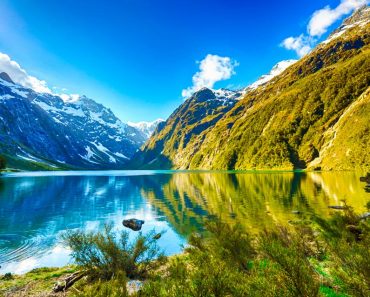
With its exceptional landscapes, comfortable climate, quality food sources and first-world economy, New Zealand is an attractive English-speaking retirement destination for USA and UK citizens. ‘Kiwiland’ is famous for relaxed outdoor lifestyles, active adventures and friendly communities, plus it’s only a short flight from Australia and the beautiful island nations of the South Pacific.
So why isn’t the entire world retiring to New Zealand? For most people, the financial requirements for obtaining a visa are the main hurdle, plus the cost of living can be similar to home. However, if you are fortunate enough to have sufficient funds and an ongoing income, New Zealand is definitely worth investigating.
To get started, here’s an overview of New Zealand’s living expenses, property ownership restrictions, main retirement visa options and investment requirements.
The cost of living in New Zealand
New Zealand is not a cheap place to live. The overall cost of utilities, groceries, transport and restaurant is similar to the USA, but more expensive than UK – particularly groceries. On average, housing rent can be around 20% lower than the USA, but 5% higher than the UK. Obviously it will depend on your location. Auckland, New Zealand’s largest city, could be much more expensive to live in than a typical USA or UK city, except the main centres like New York and London. If you’re retiring from work, detailed research is important to ensure your retirement nest egg will keep you in the lifestyle you want to enjoy in New Zealand.
New Zealand property ownership restrictions for non-residents
New Zealand doesn’t allow foreigners to buy existing housing. However, it is possible to buy land and build on it to create new housing, but you’ll need a New Zealand Inland Revenue Department (tax) number and a New Zealand bank account.
Existing housing has been added to the list of property types that require foreign purchaser approval from the Overseas Investment Office. The list also includes any property with a sale price over NZ$10 million and ‘sensitive’ areas, such as rural farm land, islands and land adjacent to the coast or lakes.
Owning property in New Zealand does not give you the right to live permanently in the country, but it can count towards your visa’s investment requirements.
New Zealand retirement visa options
As a short-term visitor
If you meet the required health, character, financial and onward-travel criteria, you may be able to live in New Zealand for an extended period each year on a standard visitor visa, or for up to two years at a time on a temporary retirement visitor visa.
Visitor visa
Maybe you just want to escape the worst of your home country’s winter by transporting part of your retirement to New Zealand every year. US citizens and passport holders can visit New Zealand without a pre-approved visa for up to three months and repeat the same every year. For UK citizens it’s up to six months and if you can prove you have enough money to support yourself you may be able to get it extended to nine months.
However, if you want to travel in and out of New Zealand more than once during your stay you’ll need to apply for multiple-entry travel conditions. If you want to buy a property to revisit each year, be sure to carefully check the foreign buyer restrictions in detail.
Temporary retirement visitor visa
If you’re aged 66 years or over, you can apply for a temporary retirement visitor visa that lasts for two years. It lets you travel in and out of New Zealand as often as you choose during your stay. You can include your partner in your application, but can’t bring dependent children with you.
You’ll need to invest NZ$750,000 in New Zealand for two years, have a further NZ$500,000 to live on and an income of NZ$60,000 a year. After approving your application in principle, Immigration New Zealand gives you three months to transfer your investment funds. You might want to apply for a three-month multiple-entry visitor visa, so you can investigate investment opportunities in person.
After two years, you can apply for a visa renewal under the same conditions. Obviously this type of visa lacks certainty as changes in your health or financial situation may mean you’re no longer eligible and have to leave the country.
As a permanent resident
There are two ways for USA and UK citizens to retire to New Zealand on a permanent basis. If you have an adult child already living in New Zealand, they can sponsor your application for a parent category resident visa. The other option is an investor visa, but you’ll need a substantial sum available to invest in New Zealand.
For both of these options you must still meet the good health and character criteria, and have sufficient funds to support yourself.
Parent category resident visa
To be eligible for this option, you need:
- An adult child living in New Zealand who is prepared to sponsor you
- NZ$1 million to invest in New Zealand for four years
- An ongoing annual income of NZ$60,000
- An additional $500,000 to live on
Your partner can be included in the application. If the application is approved, you’ll have 12 months to transfer the investment money to New Zealand. You’ll probably want to travel to New Zealand to investigate and set up your investments. If so, you’ll need a temporary work visa to do this legally. Your partner can travel with you for this period on a normal visitor visa.
When the four-year investment term ends you’ll be automatically eligible for permanent residency.
Investor visa
If you’re aged 56 or older you won’t be eligible for the skilled migrant visa category. Therefore, unless you have an adult child living in New Zealand, the entrepreneur work and residence visa may be your only path to permanent residency; but you’ll need deep pockets.
With this visa you can move to New Zealand to set up or buy a business, which you’ll have to run for some years before you can retire completely. If that’s successful, you can apply for residency after six months or two years.
There are two categories for this visa:
- Investor 1 – requires a NZ$10 million investment in New Zealand for three years
- Investor 2 – requires a NZ$2.5 million investment, but the main applicant must be under 65 years of age
For both categories you’ll need health and travel insurance in place when you apply.
Visa applications can be complex and time consuming
Applying for a New Zealand visa can take some time. The more complex the visa you’re applying for, the longer it will take to get a decision. Incorrect or incomplete information in an application can lead to significant and unnecessary delays, or even an unfavourable outcome.
An experienced New Zealand immigration consultant can help you choose the best visa for your situation and use their local knowledge to streamline the process. Retiring to New Zealand should be something you plan well in advance to ensure the best possible outcome.






